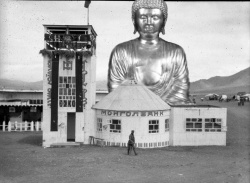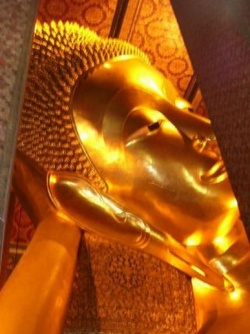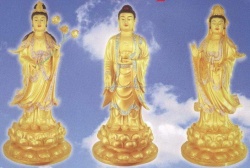Cultivation
cultivation (xiu-xing or guang-xiu) is correcting your behavior or how you speak and act and all your conduct that is not in accordance with the teachings of the Buddhas and Bodhisattvas so that such conduct is reconciled with the Tripitaka. In this way, you will be acting out of morality (precepts), concentration (samadhi), and wisdom, which represent the three principle trainings of a Buddhist as taught by the Buddha in the “Eight-Fold Path,” the fourth of the Four Noble Truths. Xiu-xing (“show-shing”) literally translates as “to examine one’s conscience and seek perfection.”
First of all we need to understand what is cultivation. Some people think that cultivation means not having an occupation but to be engaged in the daily activities of prayers to the Buddha, meditation or chanting the sutras. The actual purpose of cultivation is to eradicate our undesirable conduct and to maintain our good conduct. In other words, to follow the Bodhisattva path in emulating the practices of the Bodhisattvas. When we know the meaning of cultivation, then we understand its purpose, which is to eradicate our self serving and evil habits and thus reduce our negative karma. However, many people do not understand this principle and they misinterpret its meaning. Actually, not only those who have renounced to be Buddhist monks or nuns need to cultivate, lay-Buddhists also need to cultivate, if not more diligently. Even those who do not subscribe to any religion need to cultivate. Cultivation is not only a matter for monks or nuns alone.
What is cultivation? Where do we practise cultivation? Let me tell you a story: More than twenty years ago, I took four years to cultivate as I travelled across the country. Step by step, I covered Taiwan by walking. Once when I was in Hua-Lian, an elderly Buddhist asked me, "Master! A monk should reside in the temple to meditate, pray and chant sutras, but when you travel about what are you cultivating? I replied, "That’s right! I am cultivating. Sakyamuni Buddha teaches us to cultivate our conduct. He does not encourage us to cultivate sitting down! In the past few years I had been practising sitting meditation, now I wish to travel about. While walking and also amidst all my other activities, I do not commit evil deeds, I chant the names of the Buddhas, I praise and commend others, I tell people about the Dharma, I avoid the places of vice, this is the way I cultivate."
Thus, to cultivate means cultivating in the midst of our activities. This is a point that many people do not understand. They think that cultivation will result in a society that is pessimistic and low-spirited. This is a mistake. Jen Chen Buddhism advocates cultivating in the midst of our daily activities. Many retired old folks have no need to attend to household chores anymore, thus they can afford to spend their time to chant the names of the Buddhas and to cultivate in the midst of their leisure. However, there are many housewives who need to tend to their children, household chores and many other matters. How do you expect them to cultivate in their leisure? Thus, the need to cultivate in the midst of their activities; while cooking they could chant the names of the Buddhas and the Bodhisattvas. No matter what activities they are engaged in, it is always possible to cultivate. Instead of gossipping about our neighbours and friends or engaging in other frivolous talks, why not refrain from all these. This is cultivation. Therefore, only when we cultivate in the midst of our activities do we understand the meaning of cultivation. To cultivate in our leisure may cause others a lot of frustrations. For example, a husband may be upset because his wife neglects the household by spending too much time chanting or running from temple to temple. For her to introduce Buddhism to her husband, thus, would not be an easy task. If she understands the principle of cultivating in the midst of her activities, it would be acceptable to the husband. Should he be invited to places of vice, he would know how to turn them down because his wife is a diligent cultivator. Both husband and wife are then cultivating at the same time.
There will be progress in our society when we understand the principle of cultivation. Otherwise, society will backslide. Over the last few decades, I have come to realize that we need to cultivate wherever we are. When we possess the correct concept of cultivation, any time is an appropriate time for cultivation, any place can be the place for us to seek enlightenment. If each and everyone of us conduct ourselves in this way, then the world will become a pure land. If we think that we can only cultivate in the temples, or that we cannot cultivate when we are working, then it is very possible that we commit evils deeds without even knowing. When we are with Buddha every moment, and cultivate constantly, then we are truly practitioners of Buddhism.
As to when in the cultivation process does one awaken and what it is like to be awakened, only when you follow the guidance of the Dharma and put it into practice, will you know you have awakened: when you drink the water, only you know how warm or cold it is.
How do we practise Buddhism when we are so busy with our careers and constantly facing a shortage of time?
Cultivating amid our activities Many of us think that learning and practising Buddhism means utilising Sundays, our rest days or daily, to pray or meditate in temples. This perception is neither right nor wrong. We may be busy with our work and other activities, but, Buddhism is best practised amid these activities. Should one be totally inactive or free, what else is there to practise?
It is common to see people working and singing at the same time; machinists talking while working the machines; housewives working on their chores and exhorting their children at the same time; others work with their minds preoccupied with all sorts of other problems not related to their work. In short, they may be occupied physically, but mentally, their minds are not free or empty. As such, does learning and practising Buddhism really pose a problem to our heavy schedules? This is definitely not so. A verse from the "Seven Buddhas" reads: "Avoid all evils; do all that are good; purify one’s mind. These are the teachings of all Buddhas". So, we just need to purify our minds. While at work, although our body may be in action, it is actually amid these actions that we cultivate. The mind should not wander and the mouth should not chatter unnecessarily. We should concentrate on the work wholeheartedly, and constantly act on purifying our thoughts. This is practising Buddhism, and in fact it is the right approach. With this in mind, voice-cul2.jpg (8869 bytes) the busier we are, the more opportunities we have in cultivating. Let us not treat Buddhism as a form of superstition and think that to practise means having to make extraordinary efforts such as going to the forests or temples to meditate or to chant.
A commuter, when travelling in a train for example, may emulate the mental purity of the Buddha, and listen to the rumbling of the wheels and at the same time rythmically chant the name of the Buddha or Bodhisattva so that the mind does not wander. Naturally the mind will become pure and calm. Learning Buddhism means emulating the mental purity of the Buddha. Buddha is one who has already attained perfect enlightenment, sublime wisdom and blessings. On the other hand the commoner has lesser blessings and wisdom. Still, he would have made tremendous advancements if he merely practises Buddhism amid his daily activities to the extent that he attains purity in his bodily actions, speech and thoughts.
Thus, no matter what we do, where we are or how busy we may be, we can still practise Buddhism. As long as we put this into practise, our wisdom will develop and our blessings will gradually grow. For this reason, Jen Chen Buddhism advocates practising amid the activities of our daily lives; practising without attaching to the notion of practice; maintaining awareness without attaching to the notion of awareness; and attaining without attaching to the notion of attainment. When we understand this principle and have no more confusions, we can be considered great practitioners of Buddhism.
How should we cultivate as we learn Buddhism?
Non-origination and non-cessation Cultivation is the most important practice for a Buddhist. We need to cultivate our conduct. Having resolved to learn from the Buddha, we ought to follow the Buddha’s methods of cultivation and practice.
Our each and every action is manifested physically, but these physical actions are initiated by our mind. Hence, "Cultivating our moral conduct is better than cultivating our actions. Cultivating our mind is better than cultivating our moral conduct. Maintaining non-origination of the mind is better than cultivating it." Cultivation means examining our conduct and eradicating conduct which are undesirable, for example, those that inflict suffering on ourselves or on others. When our conduct is moral and ethical, then our actions are naturally beneficial to ourselves and others. Thus, cultivating our moral conduct is better than cultivating our actions. Unethical or immoral actions, originate from an impure mind. Once these undesirable actions arecommitted, it is too late for cultivation. Thus, it is better to cultivate the mind. To cultivate the mind after the arising of impure thoughts is also too late. Thus, cultivating the mind is still not the ultimate, it is better to spontaneously cease the arising of such thoughts all together. Since there is no arising, then there is no cessation. The verse "Non-origination and non-cessation" as described in the Heart Sutra is really a simple matter! We need to understand that learning and practising Buddhism should be as simple as possible. Indeed, it is so simple that we may find it unbelievable. Yet, it is also so simple that we may not be able to do it. We learn Buddhism to overcome our disbelief and reinforce our faith so that we have the capability to put it into practice. Thus, the saying "Faith is the origin of all paths to enlightenment." Let me use a very simple method to illustrate.
When a thought originates in our mind, it is "birth" or "origination". When the thought fades away it no longer exists, therefore it is "dead" or it has "ceased." Every moment of the day, the mind is voice perpetually engaged in a continuous process of "origination" and "cessation", or "birth" and "death" of thoughts. Unknowingly, one moment it arises, and the next it ceases. Now we need to know when these thoughts are arising and ceasing. "To know" here means "awareness". Let me use my hand to illustrate so that you may understand right away. I raise my hand now, and so my hand is "up". When I put my hand down then it is "down". Our mind constantly behaves in the same manner; one moment it gives birth to a thought ( hand is up), and the next moment the thought is dead, it passes away (hand is down). This continuous process of birth and death is called sentient beings. This process of birth and death brings forth boundless sufferings. Sentient being is boundless and therefore suffering is also boundless. When we learn and practise Buddhism it means we are striving to liberate the inner sentient being in us from these sufferings.
Now, I neither raise nor put my hand down. When the mind does not give birth, there is no death. This is no-birth and no-death, or non-origination and non-cessation. The Buddhas exist in this world for the sake of liberating sentient beings from this process of birth and death. In this way we all know that non-origination and non-cessation refers to our mind and hence maintaining the mind as such is the proper way to cultivate.
We should begin to cultivate from here. From cultivation, we acquire liberation, unfold our wisdom and widely follow the practices of all Bodhisattvas through aeons of countless births. In this way, we keep alive our hope of attaining the Supreme Enlightenment or Buddhahood. This is indeed so simple! Yet, so simple that you may not know, you may not believe and you doubt if you can actually do it. Whatever we are doing, be it walking, standing, sitting or sleeping, we only need to cultivate in this manner and maintain an unmoving keenness of our awareness. You may think that this is so simple and feel that you know all these very well. But, human beings are indeed intelligent and it is not easy for others to fool them. Yet, in a whole life time they are constantly deceived by themselves without ever knowing.
In this world we speak of "nip in the bud" to eradicate a problem. Thus, to catch a thief, arrest his leader. In Buddhism, to cultivate our actions, first cultivate our mind. When we have our mind in control, we follow up by keeping it still. We know that "our mind is not moving", see that "our mind is not moving". The "know" and "see" mentioned here refer to our awareness. It is in this way that we maintain our awareness. I hope we all will practise and cultivate following this method.
I have described the essence of the Dharma using simplest words, and when we practise as such we are with Buddha. At every moment, irrespective of our activities, be with Buddha. Jen Chen Buddhism advocates cultivating and being with Buddha amid all our activities, including walking, standing, sitting and sleeping.
Observe the mind to purify it We are all human beings and we all have a mind. We are frequently ‘deceived’ by our minds. For an entire lifetime we are ‘deceived’ and ‘misled’ by our minds without ever realizing it! If the mind is good, then of course, it is all very well. Such a mind creates a good person; one can ascend to the heavens or one can perform a lot of virtuous deeds. What happens if the mind is evil and becomes defiled? It can drag us to become animals, ghosts and deities, or descend to hell. This is because our mind is not pure, and therefore the world becomes a sea of suffering. This suffering world of ours is called the "Saha World". It means having to endure and is also called the "World of enduring sufferings".
If we all purify our minds, then the world becomes a heaven. Everybody is very happy and there is no suffering. In learning and practising Buddhism, the most important thing is to purify our minds. When we can purify our minds, then naturally there will be happiness in our world.
To do that we have to observe the non-arising of the mind. This is called ‘contemplation of the mind’. When the mind is polluted, then we cleanse it with the dew of the Buddha. And when our minds have been purified, then they are the same as those of the Buddhas and Bodhisattvas. In this way, we will progress very quickly in our cultivation.
Observing the mind is very simple. It is like watching out for the mouse. Everybody dislike mice because they steal our food or they damage our clothings. An idiom describes this sentiment with the phrase, ‘When the mouse crosses the street everybody goes after it.’ Obviously mice are not welcomed and they have to be dealt with. One method of dealing with it, is the cat. At the sight of a mouse, the cat puts his paws firmly on the ground and fixes its steely eyes on the mouse. On seeing the cat, the mouse trembles with fear, not daring to make even the slightest movement. Treat your mind as if it were a mouse and your awareness as the cat. At every moment observe your mind, in the same way as the cat watching the mouse. The mouse wants to live and hardly has time to think of its own safety, let alone of stealing food. If we can observe our minds, then we will hardly have time enough to treasure our wisdom life, let alone think of committing evil deeds.
Therefore when we are learning and practising Buddhism, we need to learn to "contemplate the mind". In this way, we will very quickly be able to avoid all evils and do all that are good.
"Avoid all evils; do all that are good; purify one’s mind. These are the teachings of all Buddhas". Besides avoiding all evils and doing all that are good, we need to purify our thoughts. When our thoughts have been purified, then the mind is pure. The purpose of learning and practising Buddhism is to purify the human mind. If the minds of everyone in the family is pure, then our home is pure; if the minds of everyone in this society is pure, then our society is pure; if the minds of everyone in the country is pure, then our land is pure; if the entire human race in the world is pure, then our world is as happy as the Western Pure Land.
Our mind is like the stealthy mouse, ever watchful of a chance to creep out to commit evil deeds, and we are not even aware of that. I hope all of us will keep a cat to watch our minds, so that we can become Buddha quickly.
Why do we need to purify our thoughts?
When the thoughts are pure all Karma are pure There are numerous types of karma, but generally they can be classified under three main types, namely, action of the body, speech and thought. However, our actions and speeches originate from our thoughts, that is, the thought preceeds the action or speech. Therefore, the first step to cultivation is to purify the thoughts. When our thoughts are pure, all our actions and speeches will be pure. When our actions, speeches and thoughts are pure, then all our karma are pure. Therefore, when we are learning and practising Buddhism, we should always be pure in our actions, speeches and thoughts.
How do we follow the Bodhisattva path?
Bodhisattva Path is Enlightenment Path The Bodhisattva Path is the Enlightenment Path. To follow the Bodhisattva Path, one first has to aspire for enlightenment for oneself and for all sentient beings. Having this apiration, one needs to cultivate and attain enlightenment. It is only when one is enlightened that all his thoughts and actions are considered to be on the Bodhisattva Path. If one has spent his entire life practising Buddhism without attaining enlightenment, his actions cannot be considered to be on the Bodhisattva Path. It can only be said that he is performing virtuous deeds.
See; “What Is Cultivation” in H.H. Dorje Chang Buddha III, the Shurangama Sutra, and True Stories About a Holy Monk.





